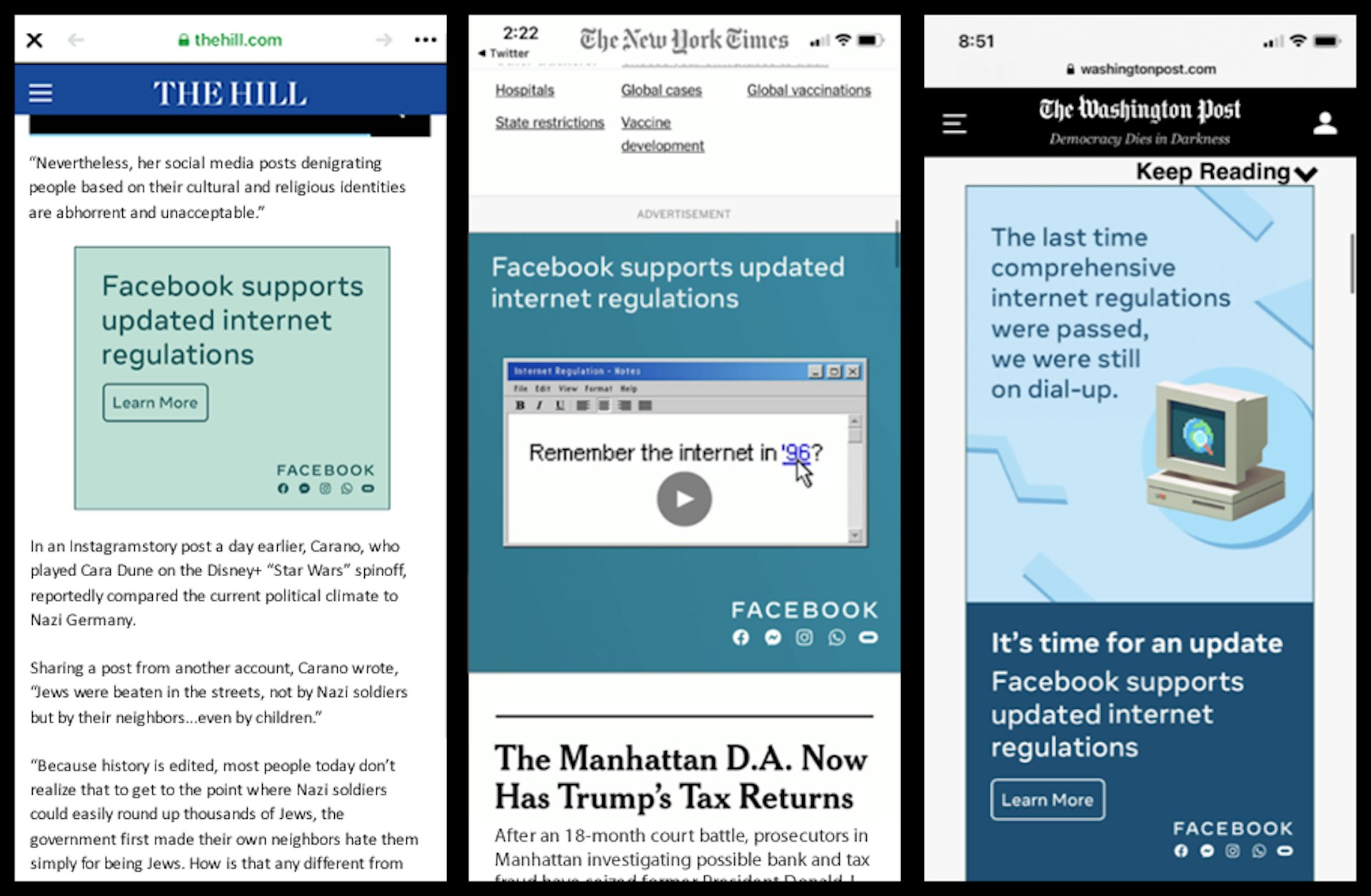Facebook CEO Mark Zuckerberg is slated to appear before Congress in a few weeks—his first testimony since the Jan. 6 Capitol insurrection that was fueled, in large part, on Facebook.
And with Zuckerberg expected to face angry questions from lawmakers, Facebook is working hard to prop up its sullied reputation with a fresh public relations blitz in the Washington, D.C., market.
The Tech Transparency Project (TTP) tracked sponsorships across 10 political newsletters targeting Beltway insiders over a five-week period from February 1 through March 5. The survey, which TTP recently shared with Wired, found a heavy presence by Facebook and the Facebook-backed political advocacy group, American Edge. Facebook has been using the sponsorships to promote the message that it welcomes government regulation—though the company favors a notably light-touch approach for any government rules.
Facebook is leaning hard on the message—which Zuckerberg himself has pushed on numerous occasions in the U.S. and Europe—as the social network faces criticism over misinformation and conspiracy theories that fueled the Capitol riot; ongoing federal and state antitrust lawsuits; and accelerating efforts in Congress to weaken its cherished liability shield.
P.R. blitz
TTP tracked sponsorships in the following newsletters: POLITICO’s Morning Tech, Huddle, and Playbook; The Hill’s Morning and 12:30pm Reports; Axios AM, PM, Sneak Peek, and Login; and Punchbowl. These newsletters typically allow their sponsors to insert a message of choice inside the digest.
The survey identified 56 Facebook sponsored messages across multiple newsletters, with at least one example every business day. In each case, Facebook pushed the message that it wants to “update” regulations. Here’s a typical insert:
A message from Facebook: It’s time to update internet regulations. The internet has changed a lot in 25 years. But the last time comprehensive internet regulations were passed was in 1996. We want updated internet regulations to set clear guidelines for addressing today's toughest challenges.
During the last week of the period reviewed by TTP—March 1 to March 5—approximately 70% of the newsletter sponsorships came from Facebook or American Edge, totalling 34 sponsorships across seven newsletters. These tipsheets allow companies to make a direct pitch to D.C. insiders including lawmakers, congressional staffers, and key personnel at regulatory agencies.
It’s likely that Zuckerberg will echo this pro-regulation mantra when he testifies virtually before the House Energy and Commerce Committee about online misinformation on March 25, alongside Google CEO Sundar Pichai and Twitter CEO Jack Dorsey. It’s the first time he and the other tech executives have faced Congress since the start of the Biden administration.
It’s important to note, however, that Zuckerberg’s vision for regulation has a number of self-serving elements. The company’s Feb. 2020 white paper on online content, for example, warns against making internet platforms liable for what users post and instead recommends rules such as “periodic public reporting of enforcement data”—something Facebook already does. Zuckerberg has also expressed support for an online ad transparency bill called the Honest Ads Act, which he said back in 2018 that Facebook is “already implementing.” And Facebook’s proposal for “data portability”—giving people a choice to move their online data between different services—is undermined by the fact that Facebook already owns other key social networks Instagram and WhatsApp.
At the same time, Facebook has enormous lobbying muscle in Washington, ensuring that it has the potential to mold and shape any regulations that emerge in Congress.
Advertising barrage
Facebook has repeated the pro-regulation message in a barrage of digital ads over the past several weeks on websites including the New York Times, Washington Post, The Hill and the Verge. Spoken or video versions of the ad have been placed in podcasts and streaming services, including The Daily, the Ezra Klein Show, Pandora music, Spotify music, and Hulu TV.

Google search ads are another way Facebook is broadcasting its support for internet regulation. When Google users search for terms like “Facebook regulations,” “Facebook antitrust,” “Tech regulations,” and “Big tech regulation,” they get served ads that link to a Facebook website touting its push for “updated” rules.
Meanwhile, American Edge, the new tech advocacy group backed by Facebook, has been spreading another Facebook-friendly message. During the period of Feb. 1 to March 5, TTP identified 35 American Edge sponsored messages in D.C. newsletters, warning that the U.S. is in danger of losing its technology superiority to countries like China. Here’s one example:
Top national defense experts detail the critical, long-term national security consequences that the United States faces if it relinquishes its technology leadership role. We must “defend our interests and advance our values in the competition between ‘techno-democracies’ like the U.S. and ‘techno-autocracies’ like Russia and China.
The message links to an American Edge report, stating that the U.S. “risks critical long-term national security consequences if it relinquishes its global leadership role in technology,” and has “fallen behind China in technologies including facial and voice technology, 5G deployment, and the commercial drone market.”
That’s very similar to a nationalistic argument Zuckerberg has been making to U.S. government officials—including Donald Trump when he was president—that Chinese tech firms pose a threat to U.S. business and American technological dominance.




